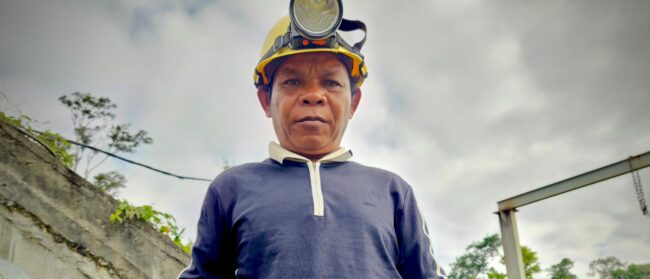The subpoena from one of Indonesia’s largest palm oil producers arrived in August 2020, warning Hemsi that he had 72 hours to leave the land on the island of Sulawesi where he and his neighbours had lived and farmed for years.
“You have committed acts against the law by occupying our palm oil plantations and carrying out illegal harvesting activities,” the letter from Jakarta stated. “You have even built a cottage without permission from us as the land owner.”
Threatening legal action against Hemsi for causing the company “material loss” on the 43 hectares (106 acres), the subpoena was signed by a representative of PT Mamuang, a subsidiary of Astra Agro Lestari (AAL), which operates palm oil plantations covering more than 1986 square kilometres (1,234 square miles), including in Sulawesi, the world’s 11th largest island.
Hemsi ignored the subpoena. He was confident the land was his and had documents he believed proved his legal ownership, some from local authorities and others from the national government. Yet the state also had allegedly ceded some of this same land to PT Mamuang in a concession dating back to 1997.
“Even if I get detained 1,000 times, I will still fight for our land,” said Hemsi, a father of three. “We cannot be intimidated or negotiated with, because this land is the future of our family.”
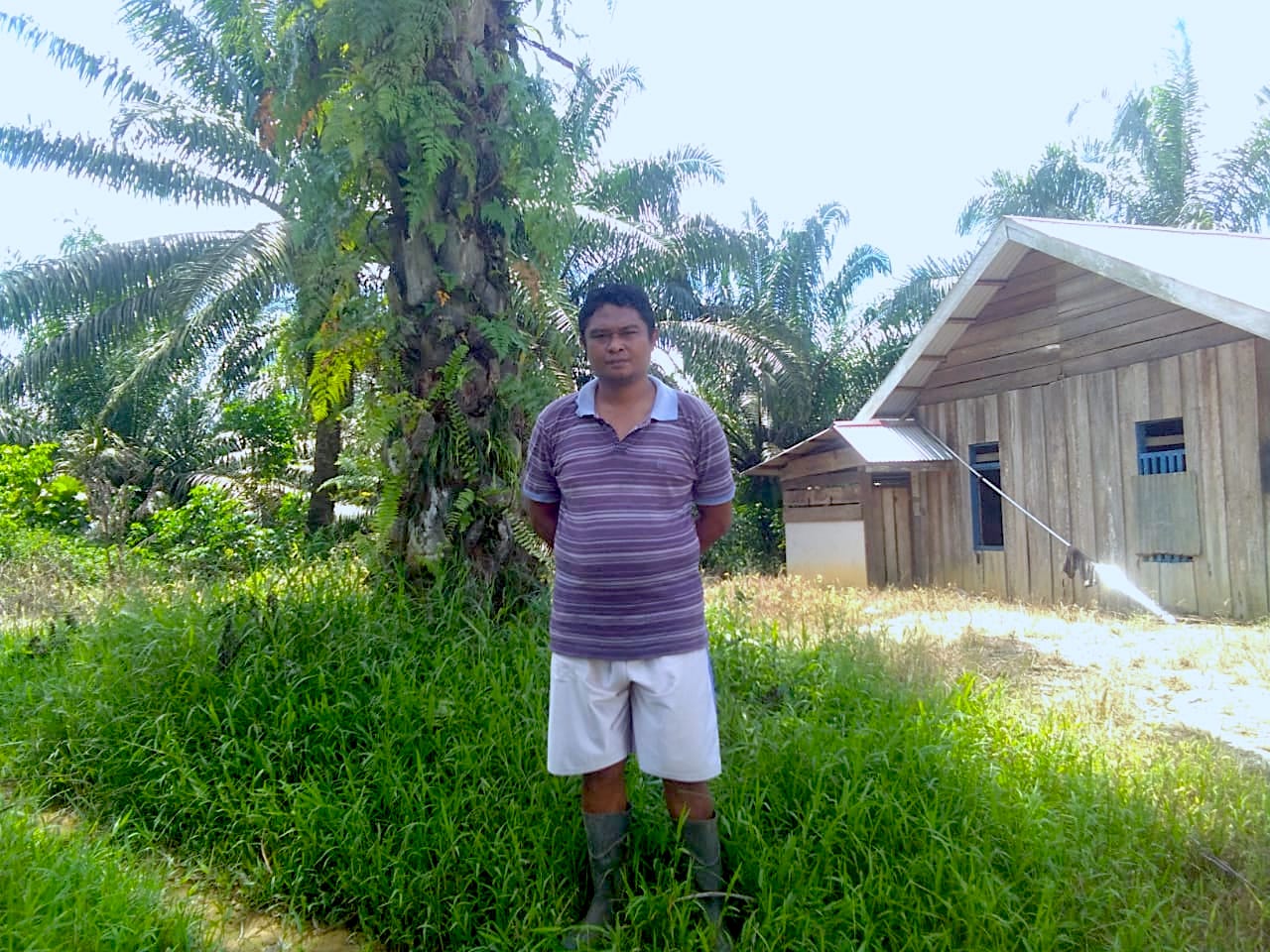
Hemsi’s situation parallels more than 300 documented plantation-related conflicts across Indonesia involving more than 3,407 kilometres (1,315 square miles) of disputed land and affecting tens of thousands of people, according to NGO Indonesia Forum for the Environment (WALHI).
In an effort to alleviate these conflicts, many of the biggest companies in the palm oil industry have adopted No Deforestation, No Peat, No Exploitation (NDPE) sustainability commitments in the last decade, including AAL. These policies include procedures known as grievance mechanisms for companies to investigate and resolve allegations of land grabbing, human rights abuses and deforestation against themselves and their suppliers.
While NDPE policies have contributed to significantly reducing deforestation, they have not been effective in resolving land disputes. Nor have the other available processes to regulate the palm oil industry, according to an investigative report released in October by the Netherlands Leiden and Wageninan Universities and Indonesia’s Universitas Andalas.
Heavily dependent on company motivation and relying on land rights and legal systems favouring the palm oil industry, these processes failed to address community grievances in 68% of the cases reviewed in the study, which selected a random representative sample of 150 land disputes to analyse. Successful outcomes took an average of nine years to achieve.
Hemsi’s case, which was not included in the study, illustrates the ongoing challenges farmers face in fair, meaningful and timely land dispute resolutions through company grievance processes.
In October 2020, the NGO WALHI raised allegations of land grabbing and criminalisation against Hemsi and other farming communities in Central and West Sulawesi by three AAL subsidiaries – PT Mamuang, PT Lestari Tani Teladan (PT LTT) and PT Agro Nusa Abadi (PT ANA) – in a complaint to US conglomerate Procter & Gamble (P&G), an indirect buyer of AAL’s palm oil.
P&G then asked Wilmar International, which buys from AAL and sells to P&G, to investigate the complaint. More than one year later, by P&G and Wilmar’s accounts, no resolution is in sight. AAL did not respond to requests for comment.
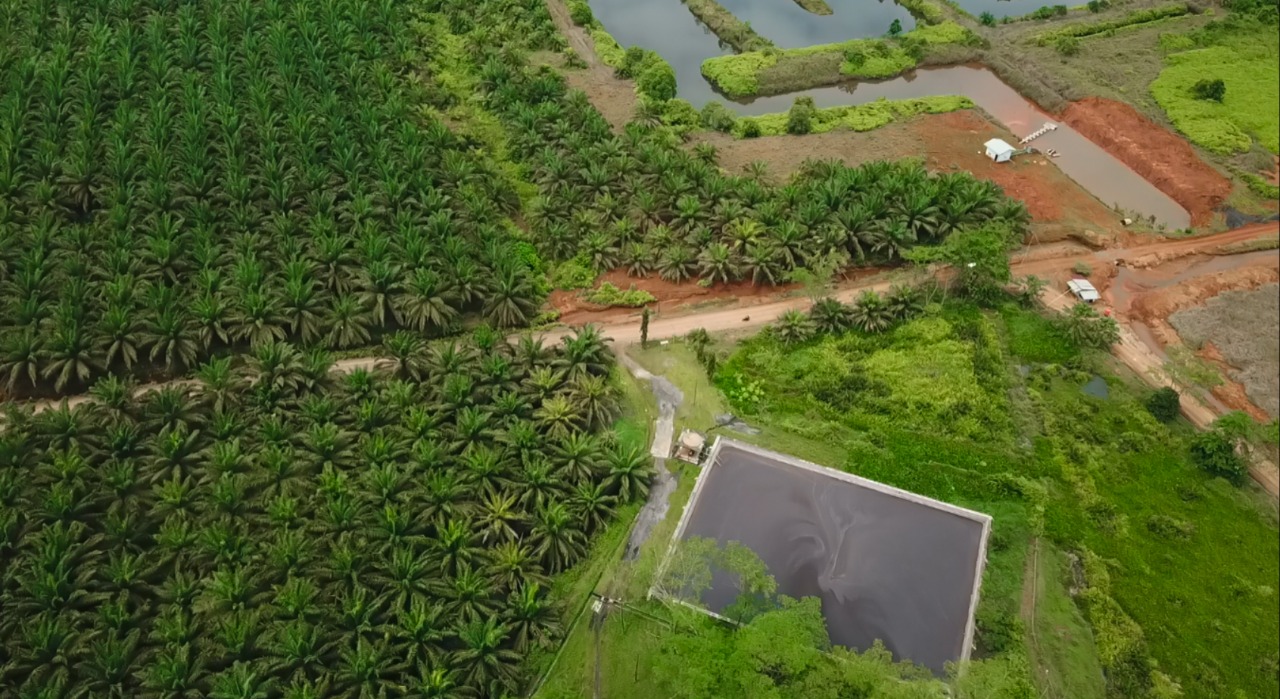
The palm oil industry has evolved in response to consumer awareness and international pressure to reduce carbon emissions through deforestation. Technological advancements in satellite imagery have been effective in allowing companies and activists to easily monitor deforestation rates.
“The Indonesian palm oil industry has changed out of all recognition in the last ten years,” said Jonathan Wootliff, a former Greenpeace activist turned sustainability consultant for palm oil companies, including AAL. “You have an industry, or at least the very big players, who understand that only sustainable palm oil is going to be acceptable in the future, if not now.”
However, industry-wide frameworks to regulate palm oil companies have also been criticised by researchers and human rights groups for weak enforcement and limited impact, especially regarding land disputes.
The Indonesian Sustainable Palm Oil certification, which mandates environmental standards for all Indonesian palm oil companies, has no guidelines for resolving land disputes, according to Human Rights Watch.
Perceiving the industry’s complaint systems and government entities as ineffective and overly bureaucratic based on past experience, WALHI decided to take Hemsi and his fellow farmers’ cases directly to P&G, hoping the American company’s grievance procedures would yield more concrete results.
“We see that P&G has a very important role in enabling the problem that those people in Central Sulawesi are facing right now,” said Agus Dwi, WALHI’s international liaison. “We want to tell them the truth about their supplier.”
After being tasked by P&G with handling the complaint, Wilmar, one of the first companies to adopt the NDPE sustainability pledge, met with AAL in November 2020.
In its grievance list, Wilmar notes AAL denied the accusations against its subsidiaries in a meeting one month after the complaint to P&G was filed.
Activists following the case consider Wilmar’s approach to dealing with the grievance disingenuous and insufficient.
Phil Aikman, an Indonesia expert with the environmental NGO Mighty Earth, argues the palm oil industry should always ensure direct testimony from impacted individuals is included when dealing with complaints about land disputes and other social issues.
“In an independent investigation, you hire somebody that has expertise on social issues, that is impartial, to really assess the validity of the grievance of the case,” he said.
Wilmar representatives dismissed criticism of the company’s grievance process and stated WALHI’s unwillingness to meet directly with Wilmar was preventing the company from conducting further investigation into the cases of the impacted farming communities.
WALHI said it declined invitations by P&G to meet directly with Wilmar and AAL because it believes neither company has done an effective job handling the grievance complaints of other NGOs and communities. Aikman, whose NGO has filed complaints with Wilmar that he says were resolved without meaningful resolution, echoed this sentiment. The case remains open.
Wilmar said it leaves issues of land disputes to local courts and authorities to resolve.
“We let it take a legal or administrative due process,” Ravin Trapshah, senior manager of sustainability communications at Wilmar. “It’s not really our position to tell our suppliers or the communities who is right and who is not.”
Unlike Wilmar, AAL has not recognised WALHI’s complaint in its grievance list. AAL’s grievance list contains just three cases, the most recent from 2018. Only one is listed as closed.
Indonesia’s legal system offers weak recognition of the land tenure for indigenous and rural communities, making it difficult for them to win in court against companies.
After Indonesia declared independence from the Dutch in 1945, the government mandated any land not held through proven ownership belonged to the state, a continuation of laws established under colonial rule. The state then handed out the land as concessions to companies like AAL.
In Sulawesi, these concessions overlapped with the thousands of square kilometres deemed transmigration regions in the early 90s, allowing primarily Javenese and Balinese migrants to populate the area as part of Indonesia’s programme to shift citizens from crowded islands to rural, less-developed areas.
The first migrants to the Central Sulawesi district now known as Rio Pakava recalled a vast swampland with soil so soft the houses swayed on their stilts when people passed by. There were no palm oil plantations in sight.
AAL subsidiaries PT Mamuang and PT LTT came to the region in the late 1990s, urging farmers to switch to palm oil cultivation to sell to them.
Some farmers reported their satisfaction in retrospective local press coverage, but not everyone was happy with the arrival of the palm companies and their claims to the land.
“Once they [PT Mamuang] had finished planting [palm oil trees], we pulled them out,” Hemsi said. “That was how we showed our resistance.”
Jufri, a farmer in Polanto Jaya, a Central Sulawesi village near Hemsi’s community, said he has been fighting against both PT Mamuang and PT LTT, which began planting palm oil trees on his community’s land with the backing of military and police in the early 2000s.
Hemsi and Jufri’s families bought their farmlands from transmigrants and refused offers to receive compensation for their farms from the companies because they did not want to leave the only asset they had.
Jufri said that farmers on land claimed by the company were shot at while their cacao trees were cut down.
“The intimidation is still ongoing for farmers who dare to be on the land,” Jufri said. “We get beaten and detained [by law enforcement], and then we are sent to prison.”
Hemsi and Jufri have each been arrested multiple times in connection with farming on land claimed by AAL subsidiaries. Arrests of local farmers and activists are common in land disputes, the 2021 study reviewing land conflicts found.
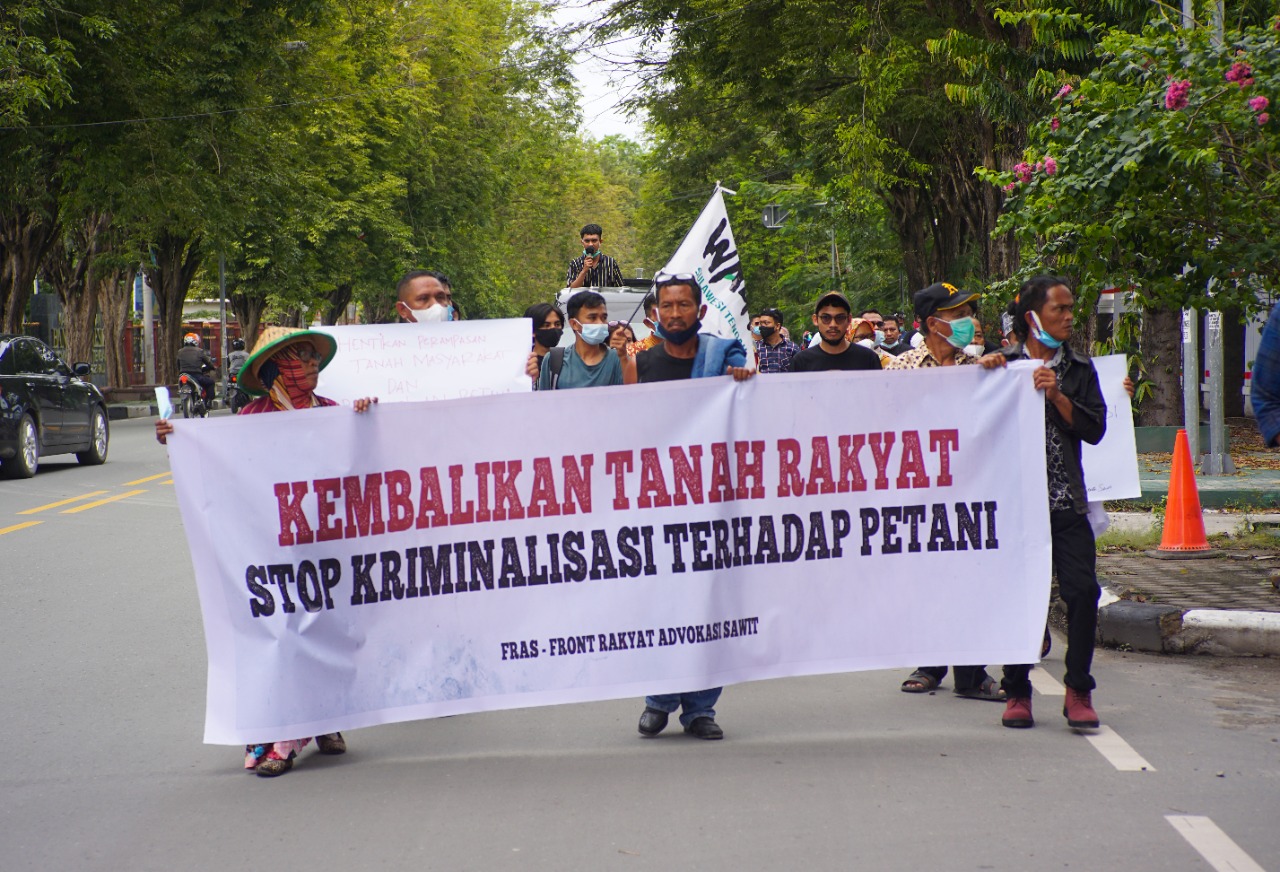
Following conflicts with PT Mamuang employees, Hemsi was arrested three different times in 2010, 2017 and 2018, the last reportedly taking place during the birth of his daughter. His charges included vandalism after he used a machete to break a company motorbike in anger and alleged theft of palm fruits he said were planted on his land.
In 2018, Hemsi filed complaints against PT Mamuang to 13 different Indonesian public and government agencies, but said no meaningful action was taken to investigate his complaints based on his locally authorised land ownership documents.
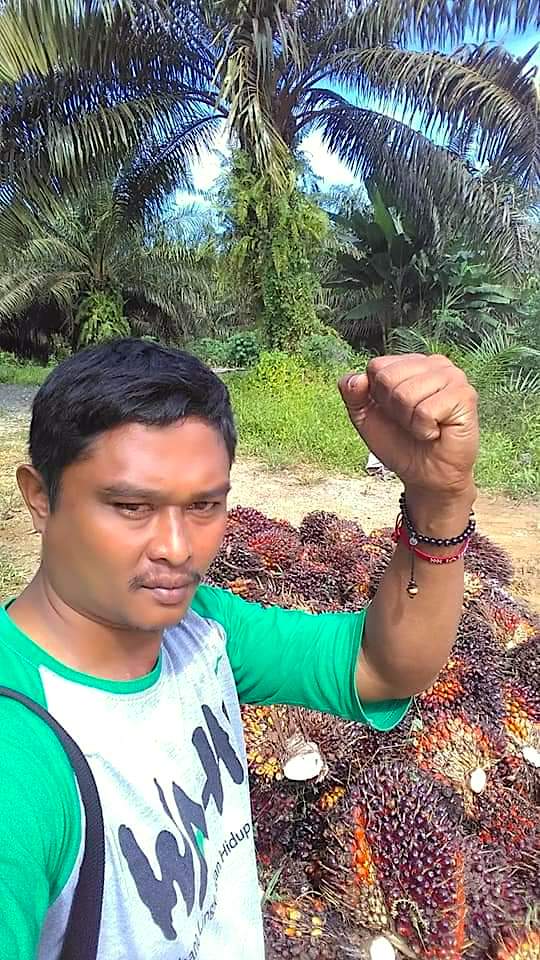
“I felt very disappointed with the local government,” he said. “Because I had shown proof that I had paid my taxes, that I had legal certificates, that I had managed my palm farm well. But no results for me and the community. It was as if we were the offenders.”
The palm oil companies’ nationally authorised land rights, known as Hak Guna Usaha or HGUs, trump the local documents held by most farmers. The HGU permits granted companies the right to use land for 25 years, including the option for renewal.
During a 2017 trial for Jufri and several other Sulawesi farmers who had harvested palms from contested land, PT Mamuang told local media the theft charges were a warning to other farmers who did not accept the HGU.
“If one firm action is not taken, it means that the public cannot be educated. And one of our goals here is to educate the public,” said Teguh Ali, a PT Mamuang community development officer.
Hemsi eventually secured nationally recognised land ownership, strengthening his claim to the land. In 2019, as part of PRONA, a national agrarian reform program to secure land rights for rural farmers, the National Land Agency granted Hemsi a certificate of land rights (Sertifikat Hak Milik) for 20 hectares of the 50 total hectares he and his neighbours use for farming.
Hemsi says the National Land Agency would not have issued a certificate of ownership for land already granted to PT Mamuang. Hemsi and WALHI say they have never seen PT Mamuang’s land use permit.
The palm oil industry commands significant influence in Sulawesi, limiting the ability of motivated local authorities to hold the industry accountable for violations of regulations, as well as preventing the publication of information which can be used in a grievance procedure to evaluate communities’ claims of land grabbing by companies.
Nusran, the Central Sulawesi assistant ombudsman, said fears of “internal and external pressures” have led to the suppression of his office’s investigations into wrongdoing within the local palm oil industry. These pressures have impacted reports related to PT LTT and PT ANA.
The assistant ombudsman said he and his family had been threatened in the past. During a 2018 investigation, which found some of PT ANA’s plantations did not have proper cultivation permits, all three colleagues working on the report resigned before the investigation was finished.
During a 2020 investigation, the Central Sulawesi ombudsman office found at least six of the ten land permits held by PT LTT, the company claiming Jufri’s land, had discrepancies between the legally allocated land and the actual plantations. The company has yet to respond to the ombudsman’s findings. The report, viewed by the Globe, remains unpublished.
WALHI hopes its 2020 complaint to P&G will result in a direct field investigation sponsored by P&G. But the NGO said the progress so far has been too slow.
In August 2021, nearly one year after WALHI filed the complaint, P&G contracted Landesa, a nonprofit focused on land rights, to review how the company’s grievance procedures were handling social issues such as land disputes, including the cases raised in the complaint, according to a Landesa spokesperson.
Dr Siân Morris, senior director of P&G Corporate Scientific and Sustainability Communications, said in an email that the company had yet to figure out how to reconcile WALHI’s complaint but is committed to moving forward.
“There’s a mistrust on both sides,” said Wootliff, the sustainability consultant who works with AAL. “The NGOs think that the companies are really trying to get away with as little as possible. And the companies think the NGOs are trying to get them to boil the ocean and solve all the problems in Indonesia.”
To solve these kinds of problems, the NGOs and companies need to build trust. Most importantly, companies need to work with NGOs and recognise there are greater ethical responsibilities than simply following the letter of the law, Wootliff argued.
For now, the cases of Hemsi and Jufri, along with other cases in the complaint raised by WALHI, appear to be at a stalemate.
Abdul Haris, the former director of WALHI Central Sulawesi who authored the P&G complaint, said he is pessimistic about the palm oil industry finding a better way to resolve these issues anytime soon, given the prevalence of overlapping land documents and a lack of will from companies and local authorities to develop effective and fair solutions.
“This will never end because the farmers will need to harvest their farms and believe they have rights over their lands,” Haris said. “And they have a legal basis that shows the lands belong to them.”
Additional reporting by Deasy Putri

